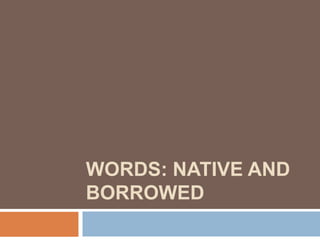
NATIVE AND BORROWED WORDS
- 2. Old English And before The language changes through time specially : Meaning and Vocabulary. This determiner which words a culture keep as their own heritage and which words it borrows from others.
- 3. The origin of words: How and where the first words came from it has been always a question . Socrates and Hermogenes’s debate : “Whether words related naturally to things they named”
- 4. 1.The shape or sound of a word has no natural relationship to the thing it names. Phonetic imitation. Phonetic symbolism. 2. The grunts and groans of work, cries of joy and sorrow, sounds made by the tongue imitating the shape of an object.
- 5. The oldest words in English. The oldest data are the words found in written texts and carved monuments. However, why have we lost some and retained others?
- 6. The most distant origins: Indo- European. If we can figure out about an old culture, how about get to know the words that they were able to pass on ? Daily life Objects Actions This concepts are so independent of particular cultures, that we will found this words passes on from generation to generation, for centuries, but at the end is the “same” word.
- 7. 1.We can find words from several languages, but refer to the same concept. Example: Aliminum 2. Words can resemble one another from language to language, because they have been borrowed from some common source.
- 8. Once we establish the principle that similar words with similar meanings, may be descended from some common but nor lost ancestor form, it becomes possible to reconstruct some of those earlier ancestral words. Sanskrit Greek Latin Gothic English Pita Pater Pater Fadar Father Each letter in the root is a symbol, derived from the phonological sounds of cognate words found in descendant languages.
- 9. Indo- European: It was once a dialect or collection of dialects of some even more distant progenitor. Sometimes, we can get words (OE) , from geographical features, or its location or sociological data that will allow guess about the general area of the original Indo-European homeland.
- 10. Indo-European > West European It has been thought that IE first split into Eastern and western branches, because of the widespread correspondences of one particular sound change east and west of a line. East: The original “K”. Then split into Balto- Slavic Indo-Iranian. The western branches split into : Hellenic Italic Germanic
- 11. Indo-European >Western European> Germanic>West Germanic. Here we found Scandinavian inscriptions and a translation of parts of the bible into Gothic. Germanic is divided into tree branches on the basis of certain phonological and grammatical changes that occurred before about A.D 600. (1)East Germanic, (2) North Germanic and (3) West Germanic. Cognates: Broth, brew, dough, loaf, wheat, silver, ware etc.
- 12. Nonetheless according with the cultural reconstruction about the language, you are able to find in some cases one word only as Germanic, or on the contrary words which have the same spelling but with different meaning. Other issue, is that the historical establish linguistics relationship as well. Between Western and Eastern languages. (Celtic- Germanic- Balto Slavic- Italic,etc)
- 13. As we know from the commom vocabulary, archeological remains. 1. Roman Invasion Their common vocabulary included, many words referring to advanced agriculture, farming, besides also added some latin words. Example: campun-camp(field-battle) tributum-trifet (tribute).
- 14. Anglo- Saxon Britain: The beginnings After the Anglo-Saxon invasion. The dialect areas that existed in Anglo-Saxon England reflected a rather social changes . Here is a list of some of the Celtic words borrowed into English. Ex: Bratt(cloak), Bannuc (piece of cake), gafeluc(small spear)
- 15. The rise of Anglo-Saxon England. The heptarchy: The original tribes had organized themselves into seven kingdoms, (Kent, Essex, Sussex, Wessex, Mer cia, Northhumbria and East Anglia). During the VII and VIII centuries, cultural and political supremacy passed from Kent until Wessex, where under Alfred. We have few texts from the Norman invasion. Ex: law- charters- little verse and few translation.
- 16. The Christian Conversion and a National Character. The conversion of England to Christianity re- introduced Latin and created monastic environments in which learning and scholarship were richly that Europe was soon sending its students to the cities. During this period poetry flowered (Beowulf). The marriage of religious laws and secular enforcement created a governing institution of great power. The organization of townships.
- 17. Latin words borrowed to Germanic. Plants and animals: 30% Food, households items: 27% Buildings: 12% Dress: 12% Trade, commerce: 9%. About 170 words were borrowed during this pre- OE period.
- 18. The Danish Invasions. At this time King Alfred defeated the Danes. Consequently in the Treaty of Wedmore, the Danes agreed to remain east of a line an area called Danelaw. Danish words borrowed into English. Ex: In the Oxford dictionary there are almost 30 or so words beginning with sk-/sc-of. Everyday words: egg-fellow-freckle-kneel-kis-led- call-loose-odd-lift etc.
- 19. The rise of London. It was during Roman times that London began to develop into the first city of the country. Before the end of the The spots on which eleventh century. London sits, it was a London had become the suitable landing place most important for ships commercial city When William the Conqueror built a London’s political ad residence, he made a few cultural strength miles encompassing resulted in its dialect Westminster and London becoming the prestige the political, commercial dialect of the land and cultural center of the land.